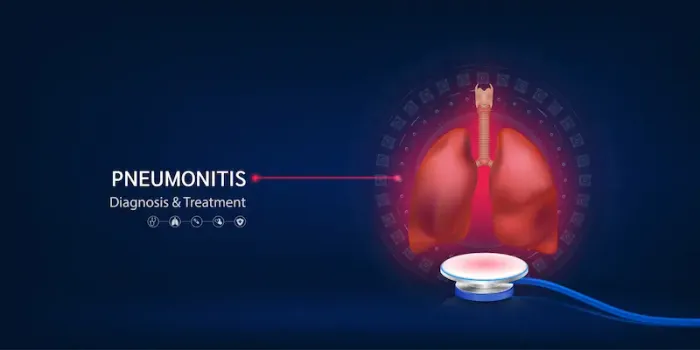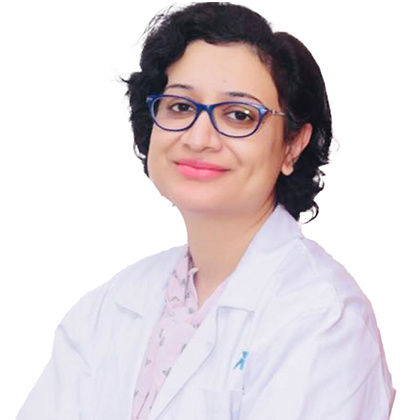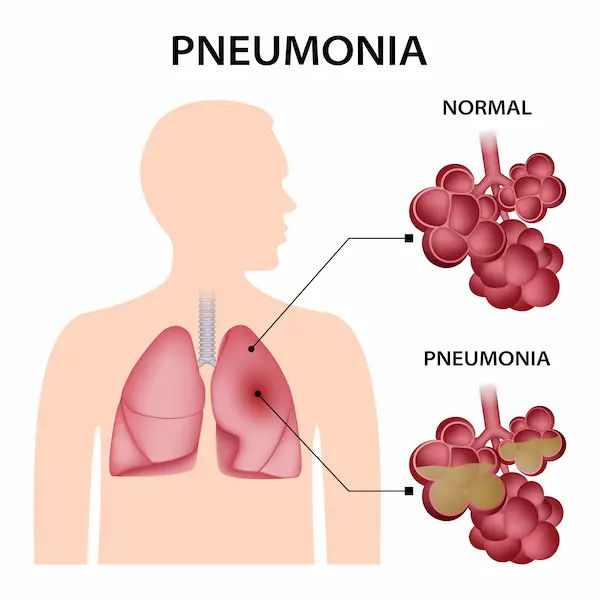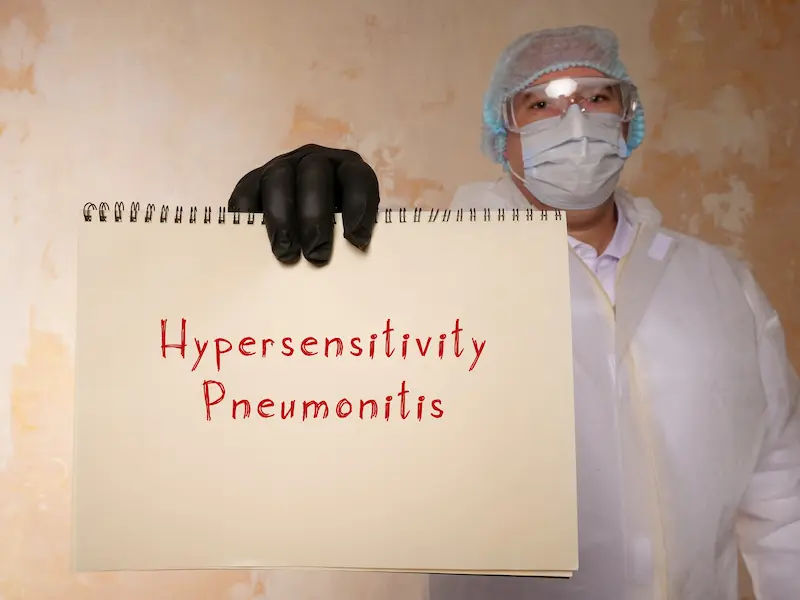Pneumonitis Overview and Treatment Options
Know all about the pneumonitis, what it is, types, symptoms, causes, diagnosis and treatment options.

Written by Dr. J T Hema Pratima
Reviewed by Dr. Dhankecha Mayank Dineshbhai MBBS
Last updated on 1st Sep, 2025

Introduction
Pneumonitis is a condition that causes inflammation in the lungs, making it difficult to breathe. Unlike pneumonia, which is caused by an infection, pneumonitis is usually triggered by exposure to irritants like dust, mold, chemicals, or even certain medications. If left untreated, it can lead to long-term lung damage.
In this article, we’ll discuss what pneumonitis is, its symptoms, causes, and treatment options. We’ll also share some helpful tips to manage the condition and improve lung health.
What Is Pneumonitis?
Pneumonitis refers to inflammation of the lung tissue, specifically the tiny air sacs (alveoli) where oxygen exchange happens. When these air sacs become inflamed, they may fill with fluid or thicken, making it harder for the lungs to work properly.
Types of Pneumonitis
There are different types of pneumonitis, depending on the cause:
1. Hypersensitivity Pneumonitis (HP) – Caused by repeated exposure to allergens like mold, bird feathers, or dust.
2. Chemical Pneumonitis – Occurs due to inhaling toxic fumes or chemicals.
3. Radiation Pneumonitis – A side effect of radiation therapy for cancer.
4. Drug-Induced Pneumonitis – Triggered by certain medications like chemotherapy drugs or antibiotics.
Consult a Pulmonologist for Personalised Advice
Symptoms of Pneumonitis
The symptoms of pneumonitis can vary from mild to severe, depending on how long you’ve been exposed to the irritant. Common signs include:
• Shortness of breath (especially during physical activity)
• Dry cough (without mucus)
• Fatigue or weakness
• Fever and chills (in some cases)
• Chest tightness or discomfort
• Loss of appetite and weight loss (in chronic cases)
If you experience these symptoms, especially after exposure to dust, chemicals, or mold, consult a doctor immediately. Early diagnosis can prevent long-term lung damage.
What Causes Pneumonitis?
Pneumonitis occurs when your immune system reacts to an inhaled irritant. Common triggers include:
• Mold and bacteria (from humidifiers, air conditioners, or damp environments)
• Bird droppings or feathers (common among bird owners or poultry workers)
• Chemical fumes (from paints, pesticides, or industrial work)
• Certain medications (like chemotherapy drugs, antibiotics, or heart medications)
• Radiation therapy (for lung or breast cancer treatment)
How Is Pneumonitis Diagnosed?
If your doctor suspects pneumonitis, they may recommend:
1. Chest X-ray or CT scan – To check for lung inflammation.
2. Pulmonary Function Tests (PFTs) – To measure how well your lungs are working.
3. Blood tests – To check for signs of inflammation or infection.
4. Bronchoscopy – A thin tube with a camera is inserted into the lungs to take tissue samples.
Early diagnosis is crucial to prevent complications like pulmonary fibrosis (scarring of the lungs).
Get Your Health Assessed
Treatment Options for Pneumonitis
The treatment depends on the cause and severity of the condition. Common approaches include:
1. Avoiding the Trigger
The most important step is to identify and avoid the substance causing the inflammation. For example:
• If mold is the trigger, clean damp areas and use air purifiers.
• If bird feathers are the cause, limit exposure to birds.
• If chemicals are involved, wear protective masks at work.
2. Medications
• Corticosteroids (like prednisone) – Reduce lung inflammation.
• Immunosuppressants – For severe cases where steroids aren’t enough.
• Oxygen therapy – If breathing becomes difficult.
3. Lifestyle and Home Remedies
• Quit smoking – Smoking worsens lung damage.
• Exercise regularly – Improves lung capacity (but avoid overexertion).
• Eat a healthy diet – Foods rich in antioxidants (fruits, vegetables) support lung health.
• Stay hydrated – Helps thin mucus and ease breathing.
4. Pulmonary Rehabilitation
• A structured program that includes breathing exercises, physical therapy, and nutritional counselling to improve lung function.
When to See a Doctor?
If you experience a persistent cough, shortness of breath, or chest discomfort, especially after exposure to dust, mold, or chemicals, consult a pulmonologist (lung specialist).
Final Thoughts
Pneumonitis is a treatable condition, but early diagnosis and avoiding triggers are key. If you suspect you have pneumonitis, don’t ignore the symptoms; seek medical advice promptly. With the right treatment and lifestyle changes, you can protect your lungs and breathe easier.
Consult a Pulmonologist for Personalised Advice
Consult a Pulmonologist for Personalised Advice

Dr Rikin Hasnani
Pulmonology Respiratory Medicine Specialist
14 Years • MBBS NTR University of Health Sciences MD NTR University of Health Sciences
Hyderguda
Apollo Hospitals Hyderguda, Hyderguda

Dr. Keshavan. V.
Pulmonology Respiratory Medicine Specialist
10 Years • "MBBS (CMC, Vellore) MD (CMC, Vellore) DNB EDARM (France) SCE(UK) ATSF (USA) MRCPS (Glasgow) FCCP (USA) FAPSR (Japan) MNAMS"
Hyderguda
Apollo Hospitals Hyderguda, Hyderguda

Dr. Pravin Madhukar Tajane
Pulmonology Respiratory Medicine Specialist
10 Years • MBBS, MD (Pul. Med.), IDCCM
Nashik
Apollo Hospitals Nashik, Nashik

Dr. Khushboo Saxena
Pulmonology Respiratory Medicine Specialist
10 Years • MBBS,DNB(Pul. Med), FCCP(USA), FSM(ISDA), MNAMS
Bhopal
Apollo Sage Hospitals, Bhopal

Dr. Viny Kantroo
Pulmonology Respiratory Medicine Specialist
18 Years • DNB Resp. Diseases, MRCP, IDCCM, EDARM
Delhi
Apollo Hospitals Indraprastha, Delhi
(100+ Patients)
Consult a Pulmonologist for Personalised Advice

Dr Rikin Hasnani
Pulmonology Respiratory Medicine Specialist
14 Years • MBBS NTR University of Health Sciences MD NTR University of Health Sciences
Hyderguda
Apollo Hospitals Hyderguda, Hyderguda

Dr. Keshavan. V.
Pulmonology Respiratory Medicine Specialist
10 Years • "MBBS (CMC, Vellore) MD (CMC, Vellore) DNB EDARM (France) SCE(UK) ATSF (USA) MRCPS (Glasgow) FCCP (USA) FAPSR (Japan) MNAMS"
Hyderguda
Apollo Hospitals Hyderguda, Hyderguda

Dr. Pravin Madhukar Tajane
Pulmonology Respiratory Medicine Specialist
10 Years • MBBS, MD (Pul. Med.), IDCCM
Nashik
Apollo Hospitals Nashik, Nashik

Dr. Khushboo Saxena
Pulmonology Respiratory Medicine Specialist
10 Years • MBBS,DNB(Pul. Med), FCCP(USA), FSM(ISDA), MNAMS
Bhopal
Apollo Sage Hospitals, Bhopal

Dr. Viny Kantroo
Pulmonology Respiratory Medicine Specialist
18 Years • DNB Resp. Diseases, MRCP, IDCCM, EDARM
Delhi
Apollo Hospitals Indraprastha, Delhi
(100+ Patients)



